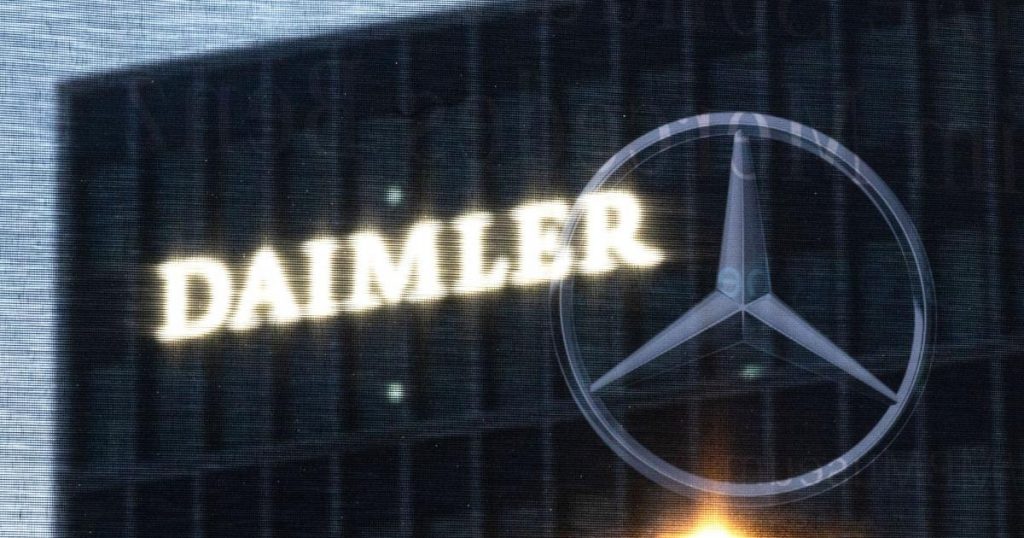German consumer advocates want to claim compensation for Mercedes customers affected by the diesel scandal. Board member Klaus Muller said on Wednesday in Berlin that the Federation of German Consumer Organizations (vzbv) has filed a model advertising case against car manufacturer Daimler to the Stuttgart Higher Regional Court. Consumer advocates accuse Daimler of deliberately manipulating emissions values.
In the opinion of the Federal Motor Vehicle Transportation Authority (KBA), Daimler has used exhaust technology that is not permitted in hundreds of thousands of diesel vehicles under its Mercedes-Benz brand. So the automaker had to recall the cars en masse. However, Daimler considers jobs to be permissible.
Consumers want legal clarity
“Despite the official recalls, Daimler AG continues to deny that it deliberately manipulated its vehicles’ emissions levels,” Muller said. The court must now determine this and give consumers legal clarity.
Consumer advocates mainly accuse Daimler of installing several start-up stops on affected diesel cars. This allows manufacturers to ensure that vehicles comply with the permissible exhaust gas limit values during type approval. But in road traffic, it sometimes exceeds this limit significantly
254,000 vehicles damaged
According to vzbv, about 254,000 Daimler cars in Germany are affected by the official recall. However, in the model suit filed by the association, it focuses on a specific type of engine (OM651). This means that owners of Mercedes GLC and GLK models can join nearly 50,000 vehicles, which can be discontinued without a software update.
SAAM in Austria joins the exemplary explanatory procedure put forward by German consumer advocates. “VSV supports Austrian owners of Daimler Mercedes vehicles and offers free and risk-free communication for the typical declaration procedure by our German lawyer,” VSV said broadcast on Wednesday.
illustrative working model
Upon request, Daimler declared that the confirmed allegations were deemed unfounded and that they would continue to defend themselves against them – also in the context of a standard explanatory procedure. This would allow “important legal issues to be clarified more efficiently, which is generally welcome,” she added.
From the point of view of consumer advocates, the typical declarative procedure is primarily intended to smooth the path to compensation. Due to the cars being recalled in 2018, the issues are now threatened with obsolescence at the end of the year. Daimler customers can block this if they join the lawsuit.
Prepare to negotiate a settlement
vzbv had filed a similar model lawsuit against Volkswagen in 2018. At the start of 2020, consumer advocates and VW agreed to a settlement that was accepted by some 245,000 customers. Volkswagen paid them between 1,350 and 6,250 euros, depending on the age and type of car. Mueller said that similar discussions can be envisaged in the Daimler case: “We are always ready to enter into settlement negotiations with Daimler.”
Shortly after the agreement at the time, the Federal Court of Justice determined that Volkswagen had systematically deceived its customers: if they knew that diesel cars with a particular engine emit far more pollutants than could be measured on a test stand, they likely would have Choose a different car. Therefore, the group is obligated to pay compensation.
Different starting position from Volkswagen
In most cases, plaintiffs were given the right to return their car, but they had to rely on its use. Instead, many agreed with Volkswagen on a one-time payment and kept the car.
Muller said the starting position is now different than in the case of Volkswagen. “Unlike Volkswagen, at Daimler, instead of a deactivator, there is a whole patchwork of allegations of tampering in the chamber.”
Basically, it was named three things that will be put into the legal focus circle: a storage mode that controls injection of Adblue urea solution and therefore nitrogen oxide emissions, exhaust gas recirculation and coolant temperature control in affected cars.
Individual lawsuits
Recently, in the case of Daimler, there has already been a whole series of individual claims for compensation – with different results. Success depends on “how those affected describe their case in court,” consumer advocates say. There is still no legal clarity about whether Daimler acted intentionally or unethically.
Muller said the technical diversity of car models has been an obstacle to the courts. The cases cannot be generalized across the board as is the case with Volkswagen. Daimler has announced that in individual proceedings before German regional and higher regional courts, about 95 per cent of cases have been decided in favor of the company.
However, according to the company, this calculation relates to all diesel operations, not just those that include cars with an OM651 engine. The typical illustrative procedure now relates only to these compounds.

“Total coffee aficionado. Travel buff. Music ninja. Bacon nerd. Beeraholic.”







More Stories
Wolfsburg instead of Wörthersee: The first GTI meeting starts at Volkswagen headquarters
Pecco Bagnaia (Ducati): Testing on the new Panigale/MotoGP
From autumn onwards, U2 will be playing again at Karlsplatz.